Cross-posted at Montclair SocioBlog.
About two weeks ago, Chris Hayes said, “It is undeniably the case that racist Americans are almost entirely in one political coalition and not the other.”
The case, it turns out, is very deniable. Alex Tabarrok at Marginal Revolution denied it with data from the 2002 and 2008 General Social Survey (GSS). He looked at three questions…
- Favor laws against interracial marriage
- Would vote for a Black for president
- Blacks should not be pushy
…and concludes:
It is undeniable that some Americans are racist but racists split about evenly across the parties.
Hayes then tweeted a retraction.
End of story?
To begin with, the sample sizes Tabarrok uses are small. In the 2002 GSS, only 87 respondents went on record against interracial marriage, and in 2008, only 80 said they wouldn’t vote for a Black for president. (All the tables and graphs presented here and in Tabarrok’s post are based on Whites only.)
Only about 5% of the sample takes the racist response to these items. But I would run the table differently. Instead of asking what percent of each party is racist, I would ask where do those few racists go.
The differences are small, but the edge goes to the Republicans.
Second, there is a difference between party identification and political ideology. If you ask not about party but about political views, the differences become sharper.
The GSS has other questions that might stand as a proxy for racism. For example:
On the average (negroes/blacks/African-Americans) have worse jobs, income, and housing than white people. Do you think these differences are because most (negroes/blacks/African-Americans) just don’t have the motivation or willpower to pull themselves up out of poverty?
Again, the differences are small, with White Republicans slightly more likely (50% vs. 45%) to say Blacks’ economic problems are caused by lack of motivation and will power. And again, the differences are larger when the independent variable is political ideology rather than party identification.
In that same GSS question about the cause of Black economic troubles, another choice is:
Do you think these differences are mainly due to discrimination?
The differences for both Party ID and Political views are clear. White Democrats and liberals are much more likely to see discrimination as a major cause.
But is this racist? Not necessarily. It might well be part of a general view of the causes of human behavior, one that emphasizes personal factors (ability, motivation, etc.) and downplays structural forces the individual has little power over (discrimination). Conservatives might use that same explanation for unemployment and low income among Whites as well. But I do not know of any GSS questions about the causes of White economic problems. (Perhaps these exist, but I am not a GSS expert.)
We do know that racists (those who say they would not vote for a Black president) are more likely to take the conservative position on the “Willpower” explanation (76% vs. 50%) and on the Discrimination explanation (78% vs. 64%) compared with those who say yes, they would vote for a Black president. But that does not mean that the other conservatives who agree with them and who deny that racial discrimination affects the lives of Black people are also racists. People can come to the same position from different places. But people can also hide their racism behind seemingly non-racial issues. In the 1960s ,70s, and 80s, many observers thought that the Republicans were using first school busing and then crime as a proxy for race, as Republican strategist Lee Atwater famously explained. And some observers today (Tom Edsall, for example) argue that the Republicans are using welfare in the same way this time around.
Other bloggers have written about the questions Hayes raised — Tabarrok has links to three of these. The most interesting I’ve come across is Will Wilkinson’s (here). His original views apparently were individual-centered and much in line with Margaret Thatcher’s dictum that “there is no such thing as society.” But that was “when I was a Rand-toting libertarian lad.”
He has now come to see that individuals, with their ideas and attitudes and “non-coercive” behavior, can add up to something greater than the sum of its parts, i.e, society. But he got to this idea by walking down the left fork of the libertarian road – the road not to serfdom but to sociology.
Eventually I realised that actions that are individually non-coercive can add up to stable patterns of behaviour that are systematically or structurally coercive, depriving some individuals of their rightful liberty. In fact, rights-violating structures or patterns of behaviour are excellent examples of Hayekian spontaneous orders—of phenomena that are the product of human action, but not of human design.

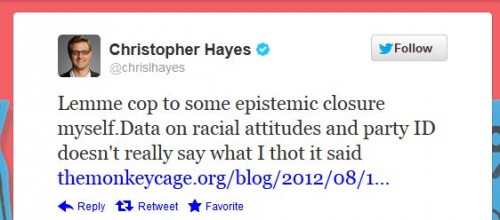
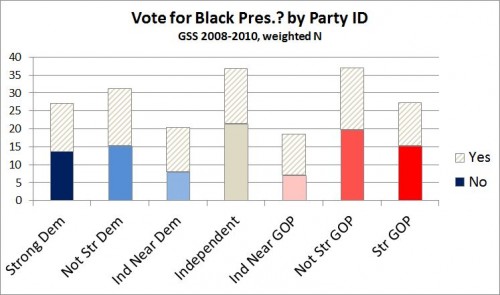
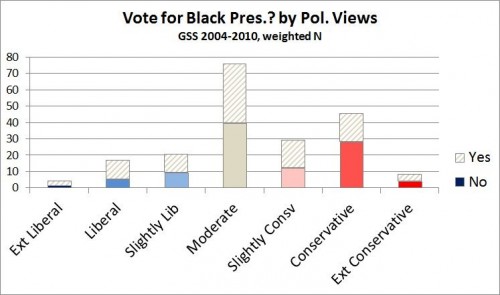
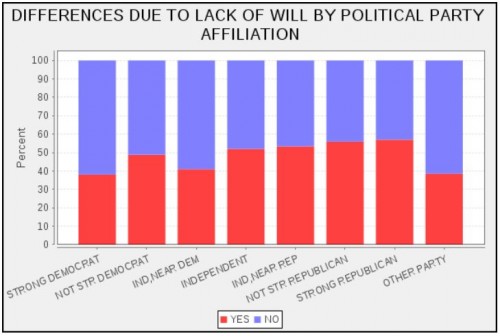
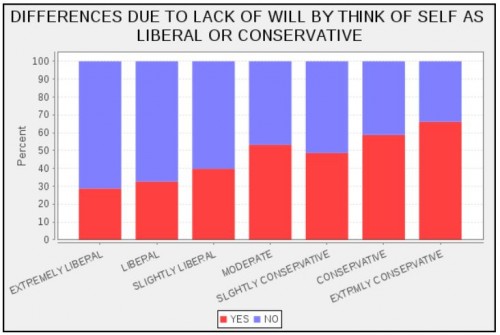
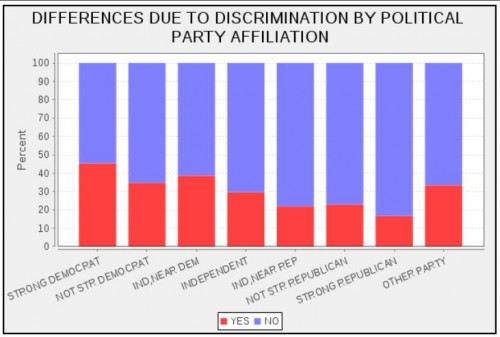
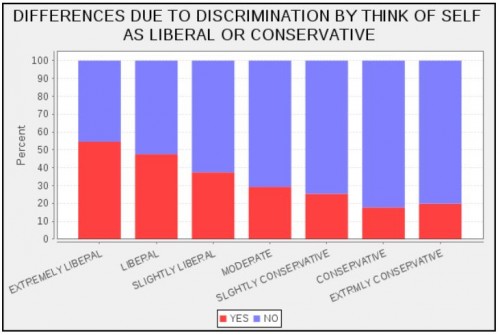
Comments 24
DumbledoreQuibble — September 1, 2012
http://goo.gl/ZCSWD
Elena — September 1, 2012
It would have been interesting to have one or two questions about Mexican or Latin people, for example. Black Americans aren't the only group people in the USA are racist against.
Andrew — September 1, 2012
Default Race Alert: The headline for this should be, "Are all the White Racists on the Right?," since the data shown here is only from White respondents. If we are to take these questions as a metric of whether someone can be termed "racist" or not (and this is in itself problematic), then surely the label must also apply to, say, Asian-Americans who would not vote for a Black president, or Blacks who would vote to criminalize interracial marriage.
On top of that, the framing would appear to suggest that the White respondents' degree of racism can be gauged entirely on the basis of their attitudes toward Blacks. But what about other minority groups? It seems entirely plausible that some White respondents would vote for a Black candidate but not, say, an Arab one. Or that they don't feel Blacks are solely responsible for their economic troubles but feel that Latinos are.
Perhaps the underlying flaw in the analysis is the artificial binary of Racist/Non-Racist. Racism doesn't tend to work in a "yes or no" sort of way; rather, it appears in subtle, ambiguous increments, and is challenged disproportionately more in some contexts than others.
If we could objectively and unequivocally assess how many people hold racist views or impulses in some form, I find it unlikely that we'd get any less than a majority of the population, irrespective of political affiliation. But "racist" is not a self-chosen identity, but rather a label based on a line in the sand. A serious study of the interaction between racism and politics would also have to find a way to tease out how many actual votes are influenced by the desire to advance a racist agenda. On this count, it would appear that one party has a substantial edge, regardless of how evenly racist sentiment is distributed across party lines.
Vadim McNab — September 1, 2012
Asians still favor Democrats (though this is changing rapidly) and they are some of the most racists people out there.
Tusconian — September 1, 2012
This article and the surveys it's based on are poor. First off, "racism" and "the answers to those questions" are not synonyms. Plenty of racist people who'd be shocked at the idea of criminalizing interracial marriage, and in fact, I would wager it's a pretty fringe idea even among bigots today. It's 2012, not 1950. However, I know scores of white, Asian, and Latina people who'd never, ever vote to criminalize interracial marriage, and would find the very suggestion shocking, but would disown their daughters for dating a black man. They are racists, but their racist beliefs aren't really taken into account because they don't operate in the same way as a Klan member from the mid-20th century. Similarly, "voting for a black president" and "not being racist" aren't mutually inclusive. This reminds me of a very, very popular attitude among many Hilary Clinton supporters in early '08. These people were undeniably democrat, and none of them would have ever admitted to not wanting a black president specifically. But so, so many of them were willing to completely abandon the Democratic party for the Republican party if Obama was the Democratic nominee opposed to Clinton. Very little legitimate reasons were given, aside from "Obama isn't liberal enough." But if the Democratic nominee is a bit too moderate, what is the logic in going for someone MUCH too conservative? I know a lot of former Clinton supporters who for a while were hard core Tea Partiers, and to deny that the Tea Party is 99% based on racism would be a foolish thing to do, at least.
Furthermore, to be honest, a lot of the racism that is common in supporters of the Democratic party doesn't matter in this particular discussion. In the discussion of the political sphere, the personal bigotries of supporters isn't the primary issue. Anyone can simply BE a racist, and plenty of Democrats are. And while equating "criminalization of interracial marriage" and "racism" is an antiquated take on it, that's more the direction we should be looking, as opposed to "who's more racist, republicans or democrats?" I would wager that most white Democrats are at least a little bit racist in some way. But the big difference is, the modern Democratic party isn't basing it's popular issues on subtly veiled racism. The Republican party of 2012 IS, and when it's not racism, it's homophobia or sexism. I'd say that there are plenty of homophobic and sexist Democrats out there too. But controversial statements about rape and the constant fight to deny gay people their rights aren't rallying cries of the Democratic party right now. The consequences of personal vs. institutional prejudices are very different, and that's why the Republican party is so often painted as the racist (or sexist, or homophobic) party. Many of those representing the Republican party are looking to institutionalize racism, sexism, and homophobia in many covert, and not-so-covert, ways. And more disturbing is, the Republican party doesn't HAVE to be that way. But those in charge know that that type of rhetoric and image will bring in specific voters. When the best minorities that the Republican party are willing to give us are Sarah Palin and Herman Cain, and even joke candidates are few and far between, it's also alienating to voters of those demographics. The Republican party is willing to alienate intelligent female and nonwhite voters to avoid alienating their straight white rich man voters. I know many women, gay people, and black people who do agree with a lot of Republican party policies who will not vote for them, because they feel it's a toss up. They either lose the policies (generally financial) that they feel will benefit them, or they lose a lot of the rights that make them feel safe in this country. The Republican party COULD shed this stigma that they're all a bunch of fat white CEOs or ignorant hicks, but they actively choose not to by pushing their worst into the media limelight, and not only that, but allowing them to almost exclusively represent their party.
Margot — September 2, 2012
(1) As mentioned before, "racism" does not equal certain prejudices against Black people or opinions on the "supremacy" of one's "race" - racism against Black people is only one type of racism, among many others. It is possible that some types of prejudices are more prevalent among Republicans or Democrats.
However, take for example the claim made by some Jewish advocacy groups, that some of the most extreme anti-Israel stances are a disguise for Anti-Semitism (remember one of the most deadly types of racisms out there?). I am not going to get into a lengthy argument whether these claims are "true" or not. However, if these claims are true, then since most of the people who express such extreme opinions are in the extreme left, "leftists" are "more anti-Semite".(2) It is difficult to pin "Democrats" and "Republicans" as left/right. Yes, most Republicans seem to be more conservative than most democrats, but many supporters of one "camp" are not so far in most of their opinions than supporters of the other.
A man. — September 2, 2012
What if you think no-one should be pushy?
NK — September 3, 2012
The question about inter-racial marriages is racist itself, like white people are doing us a favour by allowing themselves to marry other races.
In America Africans were property so they wanted to keep them separate (which didn't stop them sexually exploiting their slaves btw. If inter-racial relationships are evidence of anti -racism, good news, there never was any racism!) but other races had different roles and were defined to suit different needs. Eg- Indigenous people, whites wanted to decrease their numbers so inter-marriage was used to force assimilation and destroy their cultures and societies. It wasn't a sign of enlightenment that the 1 drop rule never applied to Indigenous people. African Americans are no longer required as a source of disposable labour so now they are targeted for assimilation too, it isn't anti-racist.
Brandon — September 4, 2012
"Would you vote for a black president?"
"Sure. Sure I would. I don't see color. I'd vote for anyone: white, black, yellow, red, green... whatever."
"Did you vote for Obama?"
"That racist, socialist, Muslim? Where is his BIRTH CERTIFICATE?"
"Do you support laws banning interracial marriage?"
"No."
"What if your daughter married a black man?"
"Well..."
So many reasons why these questions are problematic...
Allison Lukens — September 4, 2012
You talk about liberal vs conservative as if those words mean anything...
Theodore — September 5, 2012
It was Clinton, after all, who pushed the incarceration system and the zero tolerance policies, along with ending welfare as we know it...
Ojosverdes11231979 — September 5, 2012
To quote this sham article, "But that does not mean that the other conservatives who agree with them and who deny that racial discrimination affects the lives of Black people are also racists." Ummm, yes, it does actually. The only people I know who would think that blacks have or will ever have a fair shake in this country (and probably the world over) are racist.
The racial discrimination that continues to permeate every pore of our sociaty is a HUGE factor in the lives of all people of color, but mostly black people.
Ojosverdes11231979 — September 5, 2012
*society
Longhornsociologist — September 5, 2012
When I was in graduate school I dated a young white lady (I am black). Her mother found out. Her mother described herself as a pro-choice feminist. So I am good right. No. Her mother threaten to disown her if she did not break up with me. Bye bye relationship. I know the data about conservatives and racism. I accept the reality that racism is more likely to come from the right than the left. But the person who did me wrong the worst as it comes to racism is an advowed liberal Democrat. Ever since that day I do not make the mistake of thinking that racism can only be on the right. You can bet that some of those at the DNC do not want their daughter with a black guy.
Rayuela — September 5, 2012
Are the authors aware of research by sociologist Eduardo Bonilla Silva and others that suggest that questionnaires are actually quite a poor predicter of racist attitudes and that white respondents consistently give answers to survey-response studies which are belied by the answers of the same individuals to an interview-type study with a white interviewer?
(I guess this is what Brandon is trying to point out in his comment)
Necrophagi — September 5, 2012
This is all lies. The Republicans are all racists. They want to put us in chains.